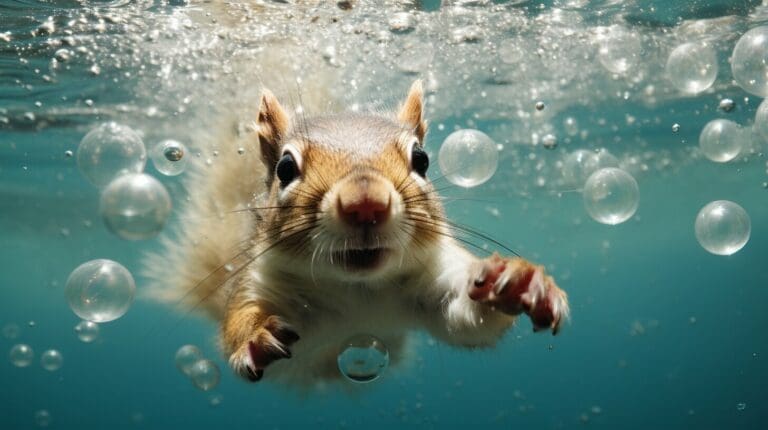Do Squirrels Eat Marigolds? How to Protect Your Garden
As you admire the bold hues of your marigolds, the question might cross your mind: “Do squirrels eat marigolds?” While their pungent scent generally deters squirrels, don’t let your guard down completely. These curious creatures might still explore your garden beds, leaving nibbled greens or small holes. The good news is that marigolds typically aren’t a squirrel’s preferred snack. But what if food is scarce? Let’s discover how to protect your beautiful blooms while understanding why squirrels might occasionally target other parts of your garden.
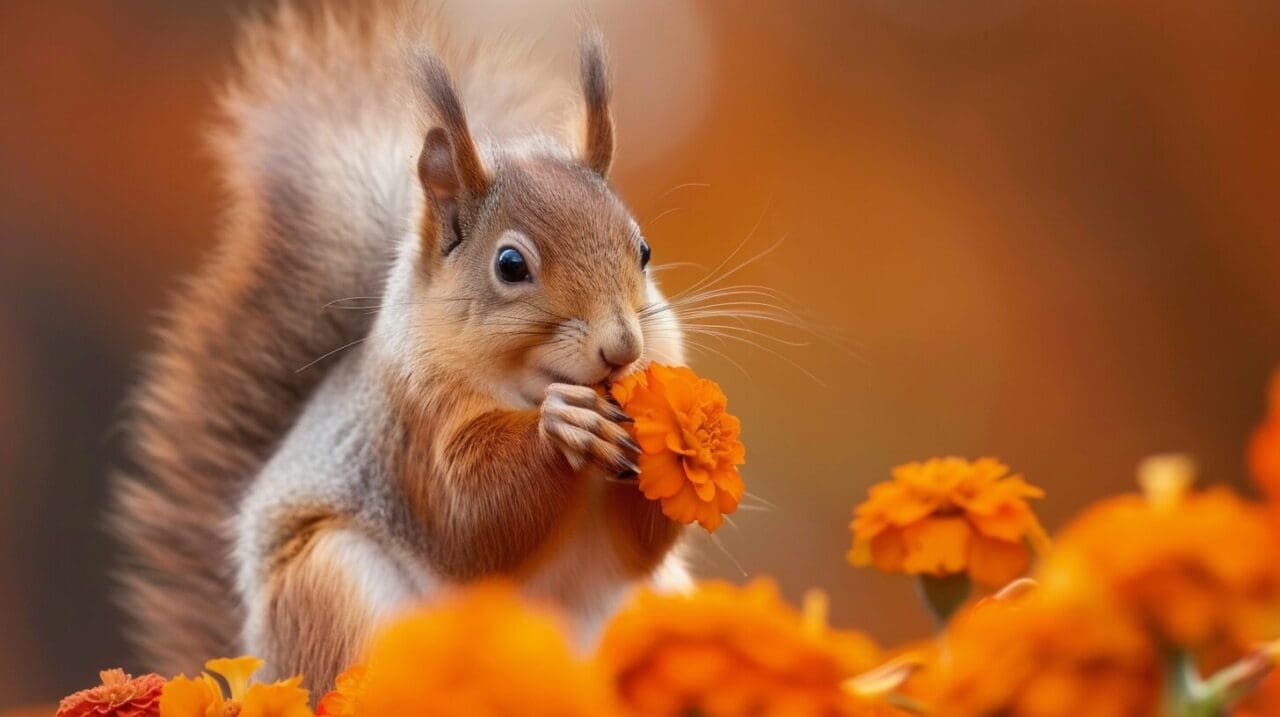
Do Squirrels Eat Marigolds?
No, squirrels typically do not eat marigolds. Marigolds contain compounds that are off-putting to squirrels, making them a popular choice for safe and natural repellant control in gardens.
Key Takeaways
- Squirrels generally avoid marigolds due to their strong scent.
- It’s essential to recognize the signs of squirrel activity to assess potential risks.
- Protecting marigolds from squirrels includes being aware of their feeding behaviors.
- Companion planting can act as a natural deterrent to safeguard your garden.
- Even though marigolds are less appealing, proactive measures might still be necessary.
The Curious Case of Squirrels in the Garden
If you’ve noticed peculiar activities around your garden, it’s possible you’re playing host to some furry little acrobats. The telltale signs are there: small, shallow holes, the remains of a feast on half-eaten fruits, and perhaps a newly planted bulb that’s mysteriously surfaced. Yes, it seems that squirrels may be the culprits. Let’s dig into determining squirrel presence, their unique behavior, and their surprising role in the ecosystem.
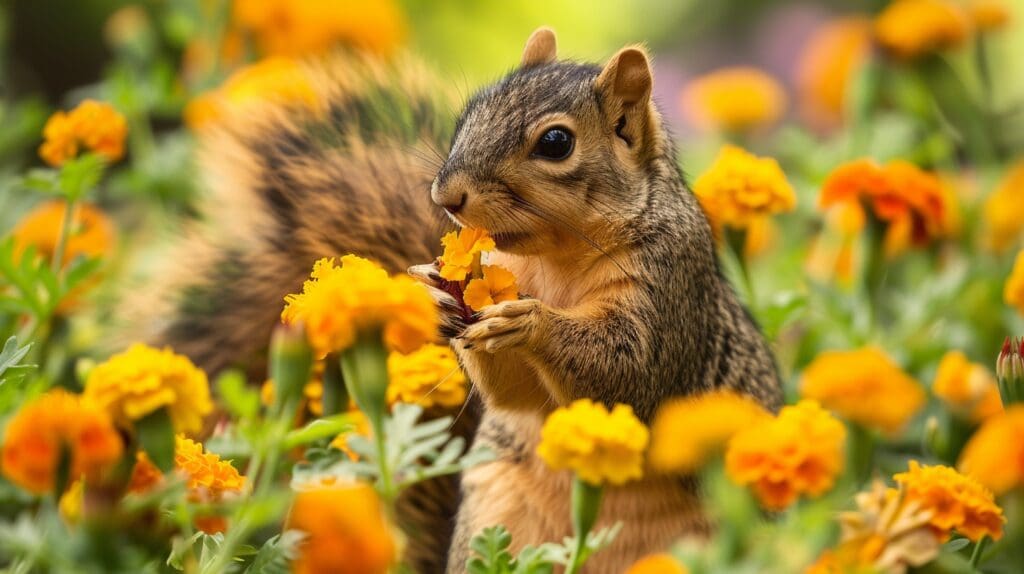
Signs of Squirrel Activity in Your Garden
Understanding and recognizing garden pests, particularly squirrels, can save you a great deal of stress. When it comes to determining squirrel presence, be on the lookout for certain clues that give away their visitations. Apart from holes and nibbled produce, you might also find nesting materials scattered or detect their scampering on overhead branches. Keep an eye out; the signs are there if you know what to look for.
Squirrel Behavior and Diet: What You Need To Know
Squirrels have a varied diet that often leads them into conflict with gardeners. Their voracious appetite for nuts, seeds, and bulbs can turn your beloved plants into a buffet, particularly in certain seasons. But don’t judge too quickly; the squirrel diet plays a significant role in nature’s cycle. These bushy-tailed guests are not just mindless garden pests; they are dynamic participants in the garden’s life.
The Role of Squirrels in the Ecosystem
It’s easy to label squirrels as nuisances, yet they are key contributors to our gardens’ vitality. These agile creatures inadvertently plant the seeds of future trees and aid in the trimming and natural maintenance of plants. Their constant search for food allows for the aeration of soil and can even control certain garden insect populations. As such, they hold a place in the delicate balance of our backyard ecosystems.
- Digging shallow holes – evidence of buried nuts or unearthed bulbs
- Half-eaten fruits – a sign of a squirrel’s snack time
- Disturbed bulbs – possibly dug up during their foraging missions
- Presence in the fall and spring – key times when squirrels are actively stocking up or seeking out food sources
- Tree branch activity – an indication of their travel or nesting habits
Do Squirrels Eat Marigolds?
Ever watched a squirrel behaving suspiciously around your marigold bed and wondered about marigold consumption by squirrels? As it turns out, marigolds aren’t high on their list of delectable treats. Their pungent aroma and strong flavor make them less than desirable for squirrels who have a wide array of preferred eating habits. But make no mistake, the alluring marigold isn’t completely safe from their curious nibbles.
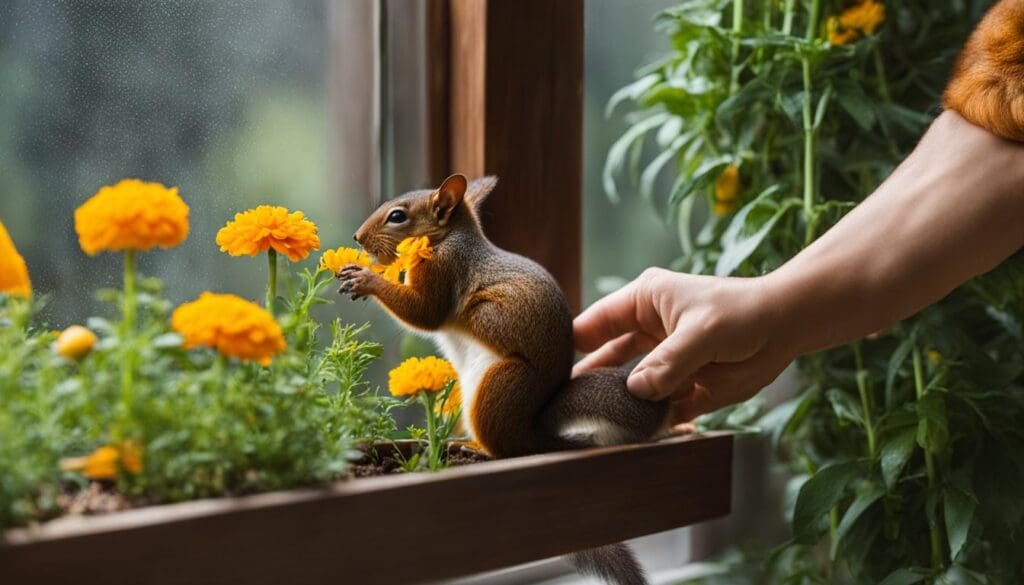
When it comes to squirrel eating habits, these creatures are anything but picky. These small but mighty foragers are known to sample a variety of items in their environment, especially when their regular food supply is sparse. It’s their adaptive nature that can occasionally spell trouble for your floral favorites. Thus, the question isn’t strictly whether squirrels eat marigolds, but rather how to lower the odds of turning your garden into a squirrel snack bar.
Protecting marigolds from squirrels is a task that many gardeners find essential. If you’re keen on keeping your marigolds pristine and untouched, consider employing a combination of strategies. While a single method might provide some relief, the true key to success is a multifaceted approach that keeps these furry visitors in search of food elsewhere.
Marigolds may have a reputation for repelling garden pests, but an opportunistic squirrel might not always turn away from these brightly colored blooms.
- Odor deterrents: Harness the power of natural repellents like spice-based sprays or scented plants that squirrels find offensive.
- Physical barriers: A well-constructed fence, mesh coverings, or barrier plants can create a blockade against squirrel invasions.
- Distractions: Offering an alternative food source away from your garden beds may redirect their attention and preserve your marigolds.
Remember, diligence in garden maintenance is vital. Regularly cleaning up fallen berries, nuts, and acorns minimizes the temptation for squirrels to visit. Ensuring your garden’s cleanliness is an ongoing task that can contribute significantly to minimizing unwanted dining on your marigolds by these agile creatures.
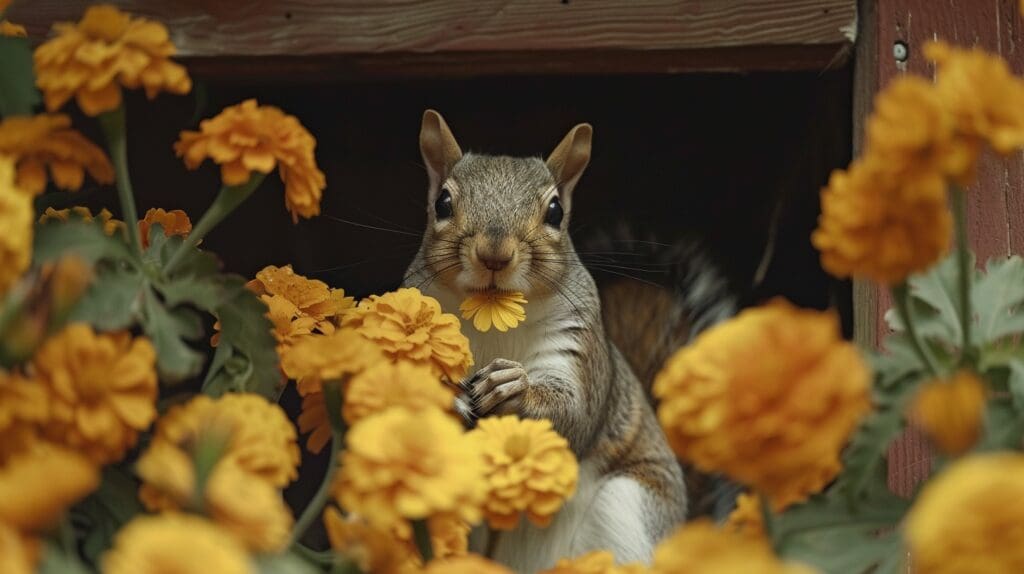
Understanding the Squirrel Diet: Preferences and Avoidances
Delving into the squirrel diet is not just about knowing what they chew on—it’s also recognizing what they turn their noses up at. Whether you’re trying to encourage these furry acrobats to visit or gently nudging them elsewhere, understanding their dietary leanings can transform your approach to garden pest management.
When you grasp the nuances of a squirrel’s palate, you can delve into fine-tuning your garden’s offerings, ensuring your green thumb efforts remain intact. Now let’s explore what exactly tempts these sprightly garden visitors and what sends them scurrying away.
Natural Foods in a Squirrel’s Diet
Squirrels, like many creatures, have a deeply ingrained preference for certain foods — a predilection sculpted by the availability of resources in their environment. The ultimate squirrel diet may surprise you in its richness; it’s a symphony of nuts, seeds, and sometimes fruits that function as their primary sustenance.
Particularly in preparation for the chillier months, squirrels are known to favor fall-planted bulbs, which they expertly detect and unearth for a seasonal feast. This relentless search for nutrition is a dance with nature that they are innately programmed to perform, a fact that can complicate garden pest management.
Plant Selection: Do Marigolds Make the Cut?
If you’re leveraging flora to fortify your precious plant babies from these nimble adversaries, you would do well to consider the aromatic arsenal at your disposal. Some plants have earned their reputation as squirrel-resistant plants, not due to an impenetrable defense, but rather their potent scents that repel the intruders.
Marigolds, alongside nasturtiums and mustard, broadcast an odoriferous signal that usually places them in the ‘do not eat’ column for squirrels. However, resourceful as they are, a squirrel experiencing a scarcity of its favorite treats may take a gamble on your marigolds, further underpinning the need for a comprehensive approach to garden pest management and plant protectiveness.
The essence of your strategy should not just be the beauty or the flair of your garden, but more so its composition—know your plants, understand your adversary, and harmonize with the rhythm of nature. With this knowledge, your garden will not only blossom but will also stand as a testament to a symbiotic relationship with the wildlife that surrounds you.
Protecting Your Marigolds: Effective Squirrel Deterrents
Protecting your lush marigolds from the playful antics of squirrels can be approached with several innovative and humane methods. These squirrel deterrent strategies are designed to effectively safeguard your gardens while respecting the furry visitors. Let’s delve into scent and taste repellents, physical barriers, and the cunning tactic of companion planting.
Using Scents and Tastes to Repel Squirrels
To keep these agile garden visitors at bay, it’s crucial to understand the role of sensory deterrents. Coffee grounds, with their pungent aroma, and dog hair can create an invisible barrier that squirrels find most offensive. By sprinkling these around your marigolds, you’re applying safe and natural squirrel deterrent methods that protect your prized blooms without harm.
Physical Barriers for Garden Protection
When tactile sensations come into play, squirrels are less likely to venture through unwelcoming textures to reach your marigolds. Row covers serve as a shield, and the incorporation of chicken wire deters digging, providing a strong frontline defense in protecting marigolds from squirrels. This direct approach ensures your flowers remain untouched and thriving.
Companion Planting With Marigolds
Integrating marigolds with other garden varieties can do wonders for your botanical sanctuary. The companion planting benefits extend beyond aesthetics; the marigold’s robust scent not only deters pests but acts as a natural guardian for its plant neighbors. This interspersing practice is a clever nod to biodiversity, fortifying your garden’s defenses organically.
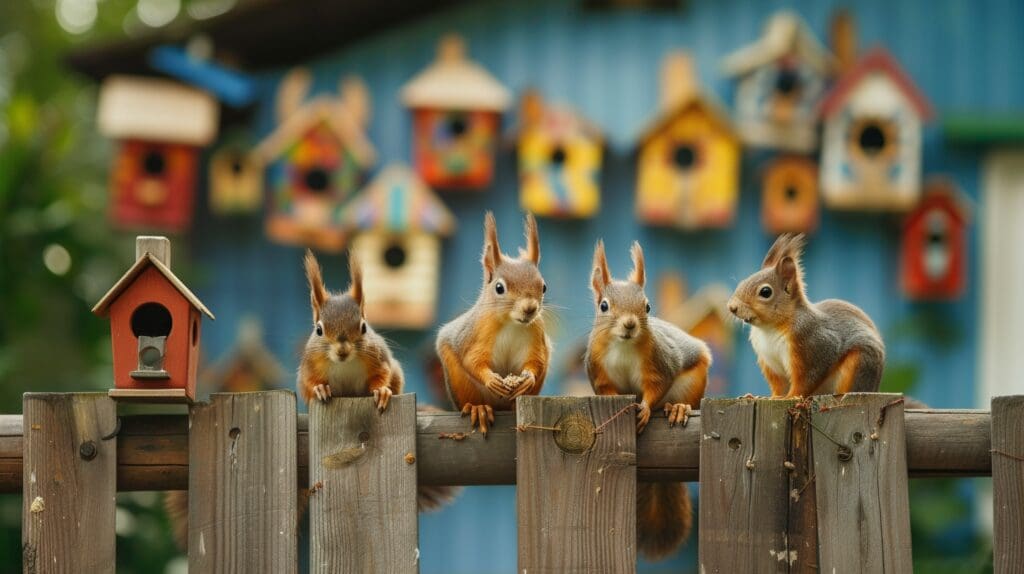
- Scatter coffee grounds around marigold beds to repel squirrels
- Strategically place dog hair to deter squirrel interest
- Use row covers and chicken wire to create a physical barrier
- Discover the companion planting benefits by surrounding your marigolds with less palatable plants for squirrels
Safeguarding your marigolds from these bustling creatures doesn’t require a battle but a blend of creative approaches. With the right tactics, your garden will not only be a spectacle of color but also a secure habitat that nurtures both plant life and the natural wildlife that visits.
The Peculiar Relationship Between Squirrels and Bird Feeders
Witnessing the high-wire antics of squirrels as they perform daring leaps towards bird feeders is both astonishing and maddening. You set up these feeders to attract beautiful chirping garden wildlife, only to discover that savvy squirrels regard this as an all-you-can-eat buffet, leading to rampant birdseed theft by squirrels. But fear not! With the help of squirrel-proof bird feeders, strategic placement, and selective seed choices, you can declare victory in this ongoing garden skirmish.
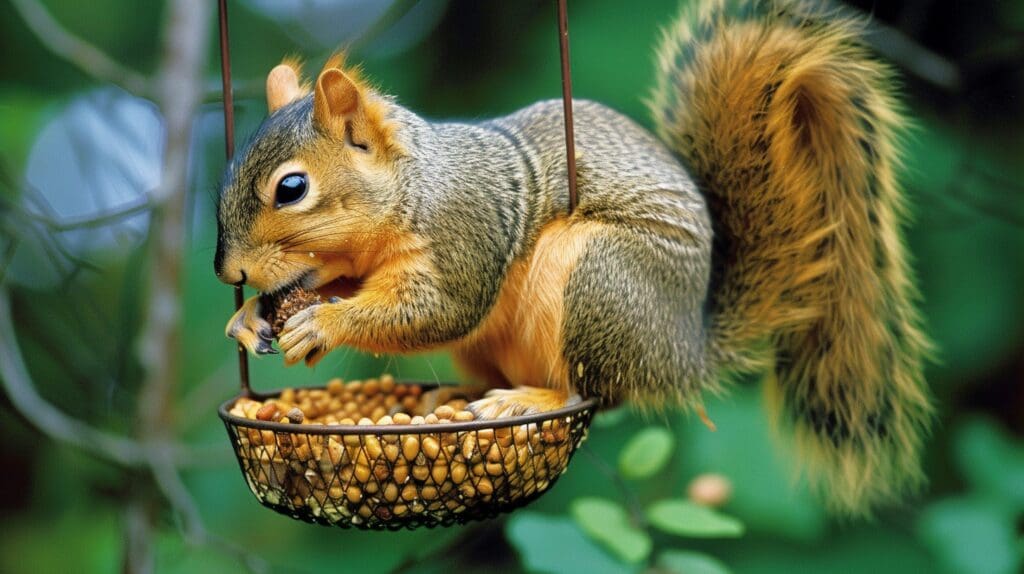
- Deploy squirrel-proof bird feeders equipped with weight-activated mechanisms to thwart the furry intruders.
- Position feeders away from launch points like trees and rooftops to minimize acrobatic raids.
- Opt for seeds like safflower that are less alluring to squirrels but still loved by birds.
The following table lays out some effective feeder types and setup tips, ensuring you make the most informed choices to outwit those pesky garden acrobats:
| Type of Squirrel-Proof Feeder | Features | Benefits |
|---|---|---|
| Weight-Activated | Closes off access to seed when a squirrel’s weight is detected. | Prevents squirrel access while allowing birds to feed undisturbed. |
| Baffle-Equipped | Curved shields that prevent climbing or leaping pests from reaching the seeds. | Excellent at deterring squirrels from approaching from above or below. |
| Caged Feeders | A wire cage surrounds the feeder, allowing birds in, but keeps squirrels out. | Lets smaller birds feed safely without competition from squirrels. |
| Spinning Feeders | Rotates or spins upon contact with a squirrel, making them lose their grip. | Offers a challenging barrier that squirrels are less likely to overcome. |
Remember, be vigilant. Successfully deterring squirrels is an ongoing endeavor that might require a mix of tactics. And while the confrontations between squirrels and bird feeders may sometimes entertain, don’t let your guard down; those acrobats are always plotting their next heist. But with these clever strategies, your feathered friends can dine in peace, and your garden will be the tranquil haven you’ve always imagined.
Comprehensive Strategies to Prevent Squirrel Intrusion
Staring down a squirrel in your garden, you might feel like you’re caught in a high-stakes game of chess. Fortunately, victory is within reach with the right combination of garden pest control strategies.
Effective squirrel behavioral deterrents can leave these crafty creatures looking elsewhere for their next meal. Simultaneously, structural garden protection like fences and raised beds can ensure your green kingdom stays sovereign.
Behavioral Tactics: Repellents and Surprises
Sending a clear message to squirrels that they’re not welcome is a matter of outsmarting their instincts. The use of unexpected elements, such as motion-activated sprinklers, sends a harmless spray of water to surprise and shoo away these furry intruders.
Additionally, odor repellents that offend their sensitive nostrils, like commercially available non-toxic sprays or natural solutions like peppermint oil, can be very effective. The idea is to create an environment that squirrels find disorienting and hostile without causing them harm.
Structural Solutions: From Fencing to Raised Beds
When behavioral tactics are paired with robust physical barriers, you create an almost impenetrable defense against squirrel invasion. Erecting fences, especially ones dug a foot into the ground, can counter even the most persistent diggers.
Raised garden beds not only alleviate back pain from bending over but also create a height challenge that squirrels might deem too much effort to overcome. For bulb enthusiasts, protective measures like bulb cages can keep your tulips tulip-ing and your squirrels frustrated.
Consider the following table that lays out essential strategic elements, their purpose, and effectiveness in keeping squirrels at bay:
| Strategy Type | Purpose | Effectiveness |
|---|---|---|
| Motion-Activated Sprinklers | To surprise squirrels and deter through harmless bursts of water. | Highly effective as a surprise element, may need reactivation after rain. |
| Odor Repellents | To discourage squirrels with repellent scents they naturally dislike. | Varies – effectiveness can decrease over time or require reapplication after rain. |
| Protective Fencing | To physically prevent squirrels from accessing the garden at ground level. | Very effective, though may require maintenance and checks for burrowing beneath. |
| Raised Garden Beds | To elevate plants beyond easy reach of squirrels. | Effectiveness varies; taller beds offer more protection. |
| Bulb Cages | To protect planted bulbs from being dug up by squirrels. | Highly effective for bulb protection when properly installed. |
In essence, thwarting squirrels involves much more than a one-time setup; it entails consistent maintenance and an understanding of nature’s rhythms. Adopting a mix of squirrel deterrents and preventive constructions can yield a peaceful coexistence within your garden haven.
And remember, the cheeky squirrel you outwit today will be the one that admires your marigolds from afar tomorrow.
Squirrel-Proofing Your Home and Garden
When it comes to home and garden squirrel-proofing, a proactive approach can spare you the frustrations of unwanted visitors. Creating a landscape and home that deter these agile creatures from setting up shop is your first line of defense. Preventing squirrel entry is not just about reacting to the problem but anticipating it.
A well-maintained yard and properly secured home can make a significant difference in keeping your space squirrel-free. Here’s how to maintain your home in a way that’s less inviting to these persistent creatures.
Keeping Squirrels Out of Your Attic
The attic is one of the most common entry points for squirrels seeking shelter. To make sure this cozy retreat isn’t compromised, you’ll want to employ a few essential tactics:
- Inspect the exterior of your home for any vulnerabilities, paying special attention to eaves, rooflines, and vents.
- Ensure all openings are sealed, using materials that are tough enough to resist gnawing.
- Install chimney caps to prevent squirrels from making their way down your chimney and into the heart of your home.
These steps not only help with deterring squirrels but also aid in better insulating your home, proving beneficial year-round.
Maintaining a Clean and Less Appealing Yard
Garden cleanliness is more than an aesthetic choice; it’s a strategic move in the game against squirrels. Here are several measures you can take to maintain a yard that’s not a squirrel’s paradise:
- Routine cleanup of fallen fruits, nuts, and other garden debris diminishes the squirrel’s food source, making your yard less appealing.
- Secure trash cans with tight-fitting lids to ensure that they’re not accessible as feasting grounds for curious critters.
- Keep bird feeders clean and tidy, without spilled seeds that could attract squirrels. Consider spacing your bird feeders appropriately to discourage squirrels from jumping aboard.
By following these tips, you assert control over your outdoor domain, making it a place of relaxation rather than a battleground with wildlife.
Marigold Consumption by Squirrels: A Detailed Examination
When considering the dietary curiosities of garden squirrels, many gardeners question: do squirrels eat marigolds? Generally speaking, marigolds have managed to gain a reputation as being less attractive to these critters thanks to their strong scent—a feature that can deter many garden pests.
However, a meticulous understanding of marigold consumption by squirrels reveals that under certain circumstances, your vibrant marigolds might not be as safe as you’d wish.
The truth is, no plant is entirely exempt from the exploratory nature of a famished or curious squirrel. While these creatures may have a buffet of preferred food sources, a determined squirrel might resort to sampling plants that it would typically bypass.
Therefore, the goal in protecting marigolds from squirrels isn’t to bank on the flower’s natural repellent properties alone but to adopt a series of proactive tactics tailored to your garden’s conditions.
Marigolds typically possess a scent that squirrels find off-putting, but the unpredictable nature of wildlife means that a hungry squirrel might just give them a try.
- Ensure consistent sanitation of your garden to diminish the attraction for squirrels.
- Apply organic, squirrel-repellent scents or tastes that are known to be unfavorable to these creatures.
- Consider physical barriers or deterrents that add an extra layer of defense around your marigold beds.
The table below details some methods that can help deter squirrels from encroaching upon your marigolds, thus minimizing the likelihood that they will become a target of marigold consumption by squirrels.
| Method | Explanation | Advantages |
|---|---|---|
| Mint and Mustard Planting | Planting these around marigolds emits odors squirrels dislike. | Offers dual benefits of pest control and aesthetic enhancement. |
| Spicy Repellents | Homemade or commercial repellents that contain capsaicin to deter squirrels. | Non-toxic and can be cost-effective with home brewing. |
| Chicken Wire Fencing | Encircling the garden or specific beds with wire deterrents. | Forms a physical barrier preventing squirrels from reaching the plants. |
By addressing the potential of marigold consumption by squirrels with a broad spectrum of defensive strategies, you can effectively enhance the measures naturally provided by the marigolds themselves. This will significantly aid in protecting marigolds from squirrels and maintaining the integrity of your vibrant garden.
Conclusion
While marigolds aren’t a squirrel’s favorite food, hungry squirrels might still nibble on them if better options are scarce. To protect your marigolds and create a balanced garden ecosystem, focus on a combination of preventative strategies. Try companion planting, providing alternative food sources for squirrels, and maintaining good garden hygiene. With a little knowledge and effort, you can enjoy beautiful marigolds and coexist peacefully with your furry neighbors.
FAQ
Do squirrels eat marigolds?
Marigolds are not a preferred choice for squirrels due to their strong odor and taste. However, if food sources are scarce, squirrels have been known to nibble on a wide range of plant matter, including marigolds. To reduce the chances of your marigolds being eaten, consider using various squirrel deterrents.
What signs indicate squirrel activity in my garden?
Common signs include small, shallow holes, nibbled fruits and vegetables, and disturbed soil where freshly planted bulbs may have been unearthed. If you’re spotting these telltale signs, you likely have some furry visitors in your garden.
How do squirrels impact the ecosystem of a garden?
Squirrels play a significant role in the ecosystem by aiding in seed dispersal, which can result in the growth of new trees. They also provide natural soil aeration through their digging habits, which can benefit plant growth.
What natural foods are part of a squirrel’s diet?
Squirrels mainly eat nuts, seeds, and fruits. They might also munch on insects, small birds, or eggs if the opportunity arises. During specific seasons, they’re particularly fond of acorns and other seeds, which they often store for winter.
Are marigolds considered squirrel-resistant plants?
While no plant is entirely squirrel-proof, marigolds are often regarded as resistant because of their pungent scent, which squirrels find unattractive. Therefore, they are less likely to be the first choice for a snack compared to other more palatable options in the garden.
What are some scents that repel squirrels?
Squirrels are deterred by strong and offensive smells. Using scents like pepper sprays, garlic, vinegar, and even the smell of predators, such as dog hair, can help keep them away from your plants, including marigolds.
What sort of physical barriers can protect my garden from squirrels?
Protective measures such as chicken wire, hardware cloth, and plant cages can effectively keep squirrels away from specific areas of the garden. Raised garden beds and securely covered rows are also helpful physical deterrents.
How can I use companion planting to safeguard my marigolds from squirrels?
Marigolds can function as a companion plant due to their strong scent, which generally repels garden pests, including squirrels. Planting marigolds alongside more vulnerable plants may help to protect them from being eaten.
Can I squirrel-proof my bird feeders to prevent seed theft?
Yes, you can invest in squirrel-proof bird feeders equipped with mechanisms that block squirrels or use baffles to prevent them from reaching the birdseed. Also, choosing seeds that are less appealing to squirrels and positioning the feeders away from jumping-off points can help.
What are some ways to prevent squirrels from entering my home?
To keep squirrels out, seal entry points like small openings in the attic, install chimney caps, and ensure that vents are covered. Making your yard less welcoming by securing garbage and reducing food sources also deters squirrels from nesting in or near your home.
Do marigolds fully deter squirrels?
No plant, marigolds included, can completely deter a determined squirrel, especially when other food sources are not available. While squirrels typically avoid marigolds because of their scent, they may still sample them out of curiosity or necessity. Therefore, employing multiple deterrent strategies is important for better protection.




